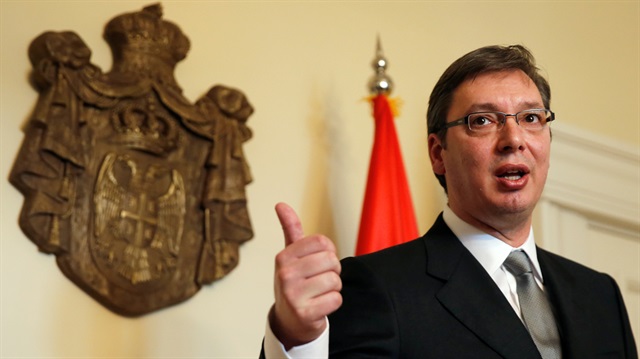
Turkey, which has become a key bridge country for the future of global energy, is also vital for Serbia’s energy security, Serbian President Aleksander Vucic said Monday in Istanbul.
Speaking at the presidential session at the 22nd World Petroleum Congress, of which Anadolu Agency is the global communication partner, Vucic said energy security, which is the need to provide regular and sustainable energy supplies, has come to the fore of foreign policy priorities, particularly when it comes to gas supplies.
“Central and Eastern European countries, including the Republic of Serbia, are mostly dependent on imports for oil and gas supplies. That is why safety is one of the most important issues,” he said.
Because a country's energy risks are dependent on the region's security, Vucic called for the strongest support possible from the EU and from other interested partners.
"It is very important for us to emphasize today that the support of Turkey is important. Turkey once again became the key bridge country to the energy future for us all. We need to build a true political friendship between all our countries and people in all our counties, who will be fully dependent on the arrangements and agreements that we will be able to reach in the future," he asserted.
He said that Serbia's important geostrategic location has not been fully utilized as a country bordering eight other countries.
"With regard to electricity networks, interconnectors are quite developed and are continuously being improved. However for oil and gas networking, the situation is more different, not only in Serbia but also in the region. It requires strong political and financial support for the region to realize the previously identified big infrastructure projects as well as in developing new ones," he warned.
One of the big infrastructure projects includes the TurkStream natural gas project currently under construction.
"Serbia expects to reach an agreement [on the project] if the pipeline transverses its territory," he said, adding that "such an option is indisputably in the interest of Serbia, but also offers opportunities for others in the region."
"Additionally, we are also closely monitoring the news regarding gas resources in the East Mediterranean," the Serbian president said, while expressing his hope that gas from the region would find its way through interconnectors.
The East Mediterranean region has several natural gas fields, which as yet have not been commercialized via pipelines or LNG facilities, such as the Leviathan field with a capacity of 620 billion cubic meters (bcm) and the Tamar field with 283 bcm in offshore Israel.














